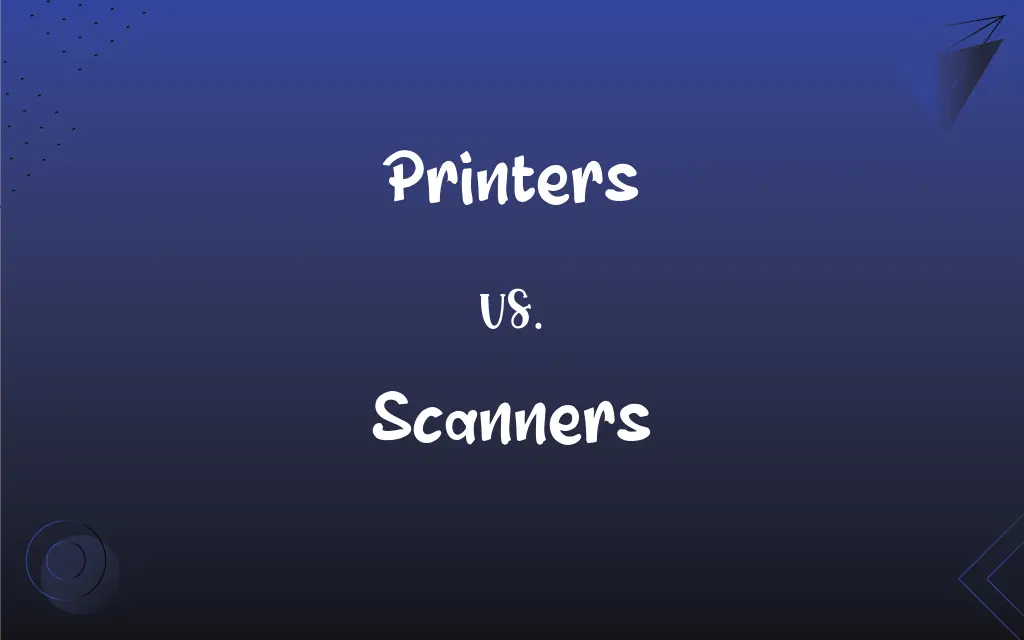Printers vs. Scanners: What's the Difference?
Edited by Harlon Moss || By Janet White || Published on January 27, 2024
Printers create hard copies from digital files, while scanners convert physical documents into digital format.

Key Differences
Printers are devices that produce physical copies of digital documents or images. Scanners, in contrast, create digital versions of physical documents or images.
In an office setting, printers are essential for creating hard copy reports, letters, and presentations. Scanners are used to digitize documents for emailing, archiving, or editing.
Printers operate by applying ink or toner onto paper, reproducing the digital file's content. Scanners use light-sensing technology to capture the image of a document and convert it into a digital file.
Printers come in various types, such as inkjet, laser, and 3D printers, each serving different printing needs. Scanners also vary, including flatbed, sheet-fed, and handheld models, tailored to different scanning requirements.
Modern printers often feature wireless connectivity and can print directly from smartphones or cloud storage. Scanners require software to process the scanned image, often providing options for format conversion and editing.
ADVERTISEMENT
Comparison Chart
Primary Function
Producing hard copies
Converting documents to digital
Output
Physical document or image
Digital file
Operation
Uses ink or toner
Uses light-sensing technology
Common Types
Inkjet, laser, 3D
Flatbed, sheet-fed, handheld
Connectivity
Often wireless, cloud printing
Typically requires a computer
ADVERTISEMENT
Printers and Scanners Definitions
Printers
A person whose occupation is printing.
The printer delivered the custom brochures today.
Scanners
Equipment used to scan the body for diagnostic purposes.
The MRI scanner provided detailed images of the patient's brain.
Printers
A device that creates three-dimensional objects.
He used a 3D printer to make a prototype of his invention.
Scanners
A device for scanning or monitoring various radio frequencies.
The police scanner helps them stay informed about local emergencies.
Printers
A machine that prints text or images onto paper.
The office printer is out of ink again.
Scanners
Software or tools used for detecting viruses or vulnerabilities.
The antivirus scanner detected a threat on my computer.
Printers
An establishment where printing is carried out.
We're visiting the printer to check the proof of our book.
Scanners
A device that captures the physical shape of an object in 3D.
The architect used a 3D scanner to model the historic building.
Printers
A driver or program that controls the printing process.
I need to update the printer software for better performance.
Scanners
A machine that scans documents and converts them to digital format.
I used the scanner to digitize our family photos.
Printers
One that prints, especially one whose occupation is printing.
Scanners
One that scans
A scanner of newspapers.
Printers
A device that prints text or graphics on paper.
Scanners
A receiver that continuously broadcasts signals it detects from specified radio frequencies
Heard about the robbery over the police scanner.
Printers
A 3D printer.
Scanners
An optical scanner.
Printers
Plural of printer
Scanners
A device, such as a CT scanner or PET scanner, for observing internal organs, tissues, and other parts of the body.
Scanners
Plural of scanner
FAQs
What is a printer?
A printer is a device that creates hard copies of digital documents or images.
What is a scanner?
A scanner is a device that digitizes physical documents or images into electronic format.
Do scanners also print?
Typically, scanners only digitize documents and do not have printing functions.
Can printers also scan?
Some printers, known as all-in-one printers, have scanning capabilities.
What are the main types of printers?
Common types include inkjet, laser, and 3D printers.
Can printers connect to mobile devices?
Many modern printers support wireless connectivity with smartphones and tablets.
What are the common types of scanners?
Popular types include flatbed, sheet-fed, and handheld scanners.
Are 3D printers common in homes?
3D printers are becoming more common in homes, especially among hobbyists and professionals.
Are laser printers better than inkjet printers?
It depends on the need; laser printers are faster and more cost-effective for text, while inkjets are better for color and photo printing.
How do I choose a scanner?
Choose based on the volume of scanning, the type of documents, and desired features like resolution and speed.
Do printers come with scanning software?
All-in-one printers often come with software that includes both printing and scanning functions.
Are inkjet cartridges expensive?
Yes, inkjet cartridges can be costly, especially for printers that are used frequently.
Do scanners need special software?
Yes, scanners usually require software to process and manage the scanned images.
Can flatbed scanners scan multiple pages?
Flatbed scanners can scan multiple pages but typically one at a time.
How do wireless scanners work?
Wireless scanners connect to computers or networks via Wi-Fi or Bluetooth, eliminating the need for wired connections.
Do printers need regular maintenance?
Yes, printers require regular maintenance, like cleaning and replacing cartridges or toners.
Can scanners convert text to editable format?
Yes, with Optical Character Recognition (OCR) technology, scanners can convert text documents into editable formats.
Are scanners accurate in color reproduction?
High-quality scanners are quite accurate in color reproduction, but it can vary based on model and settings.
Can I print photos with a regular printer?
Yes, but the quality depends on the printer's resolution and the type of paper used.
How long do scanned documents last?
Digital scans can last indefinitely if properly stored and backed up.
About Author
Written by
Janet WhiteJanet White has been an esteemed writer and blogger for Difference Wiki. Holding a Master's degree in Science and Medical Journalism from the prestigious Boston University, she has consistently demonstrated her expertise and passion for her field. When she's not immersed in her work, Janet relishes her time exercising, delving into a good book, and cherishing moments with friends and family.
Edited by
Harlon MossHarlon is a seasoned quality moderator and accomplished content writer for Difference Wiki. An alumnus of the prestigious University of California, he earned his degree in Computer Science. Leveraging his academic background, Harlon brings a meticulous and informed perspective to his work, ensuring content accuracy and excellence.































































